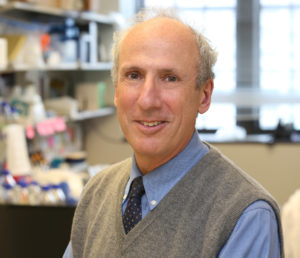
Northwestern scientists have discovered how certain genetic mutations can weaken protein “quality control,” identifying a pathway that may contribute to several neurodegenerative diseases.
The study, published in Nature Neuroscience, identified Lethal (3) malignant brain tumor-like protein 1 (L3MBTL1) as a major weak point: Higher-than-normal levels of L3MBTL1 were associated with impaired protein homeostasis in mice with amyotrophic lateral sclerosis (ALS). Nullifying L3MBTL1 using therapeutics could represent a new treatment strategy for these diseases, the authors said, although additional investigation is required.
“This work continues to strengthen the case that protein quality control is a fundamental problem in neurodegenerative disease,” said Robert Kalb, MD, director of the Les Turner ALS Center at Northwestern Medicine, chief of Neuromuscular Disease in the Ken and Ruth Davee Department of Neurology and the Les Turner Professor, and co-author of the study. “Deeper exploration of the ways cells handle damaged and misfolded proteins will reveal targets for therapeutic intervention. We are still early in this journey.”
Jelena Mojsilovic-Petrovic, MD, PhD, research assistant professor of Neurology in the Division of Neuromuscular Disease, was also a co-author of the study.
Protein homeostasis — the complex processes that regulate the amount of and stability of proteins — is vital for cellular fitness. Most organisms have developed sophisticated mechanisms to deal with misfolded proteins. This includes engagement of molecular chaperones (which can re-fold misfolded proteins) or protein degradation either through the ubiquitin-proteasomal pathway or the lysosomal autophagy pathway.
Many neurodegenerative diseases are characterized by accumulation of toxic proteins, pitting these systems in conflict with one another. Previous studies have found disposing of misfolded proteins through autophagy requires activation of p53, a common tumor-suppressing pathway, though the exact regulatory mechanisms are poorly understood.
Using both worm and mouse models, Kalb and colleagues knocked out expression of L3MBTL1, finding that afterwards, the mice experienced accelerated protein degradation through the p53 pathway. They also discovered another influence on this pathway, SET domain-containing protein 8 (SETD8), that was involved with aberrant protein disposal in a similar but distinct role.
When levels of misfolded proteins were reduced, mouse models experienced fewer motor system symptoms, such as poor locomotion, and p53 played a central role in both pathways.
“The data collectively suggest that p53 is a master regulatory switch for protein quality control,” Kalb said. “The new findings implicating p53 in the protein quality control network are of outstanding importance, because now we can leverage what we know about p53 in the cancer world and apply it in the neurodegeneration world.”
Because both proteins were present at high levels in the central nervous systems of mice with ALS, this may indicate there is some mechanism in the disease that upregulates the proteins, making it easier for toxic proteins to proliferate throughout the brain.
If scientists could discover how ALS upregulates these proteins, they would have a new target for therapeutic intervention that could boost ALS patients’ ability to clear out these toxic proteins.
The study was supported by grants from the National Institutes of Health grants NS074324, NS089616, NS110098, NS096746 and NS093439, the Packard Center for ALS Research at Johns Hopkins, the Muscular Dystrophy Association, the ALS Association and the Maryland Stem Cell Research Fund and the Les Turner ALS Center.






